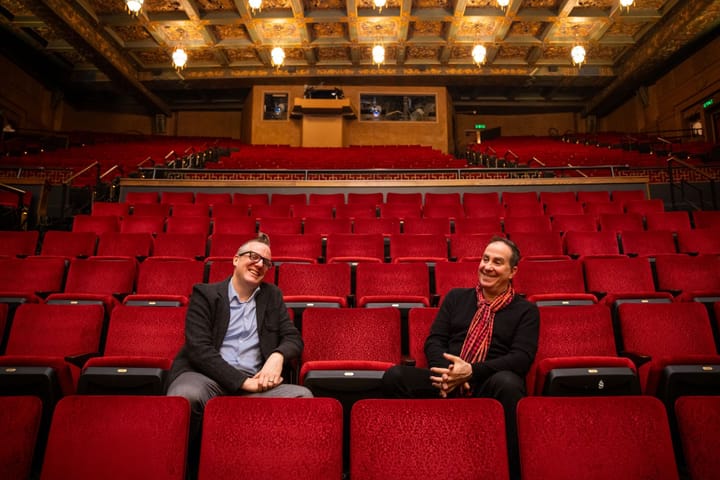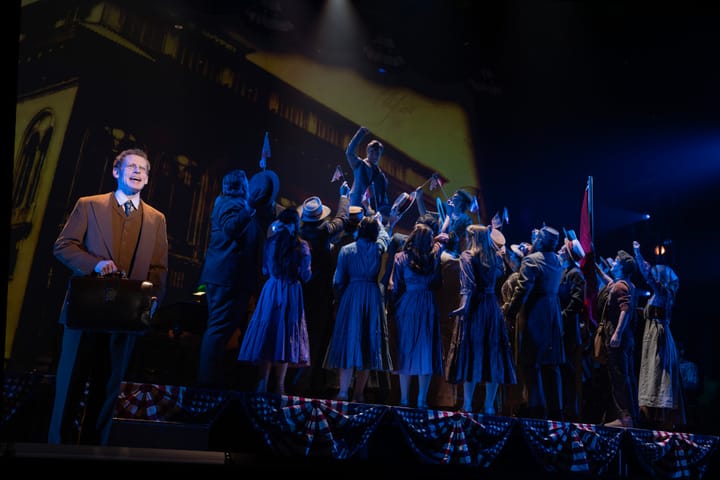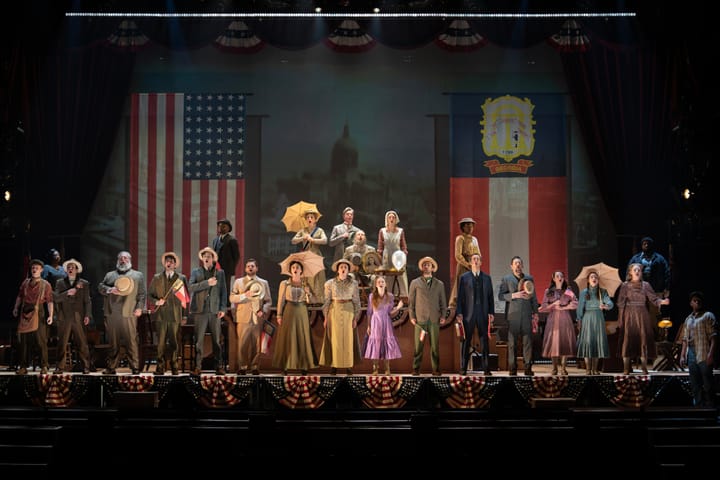A World of Sound
Exploring sound design possibilities with musician and composer Rob Witmer | By Todd Matthews
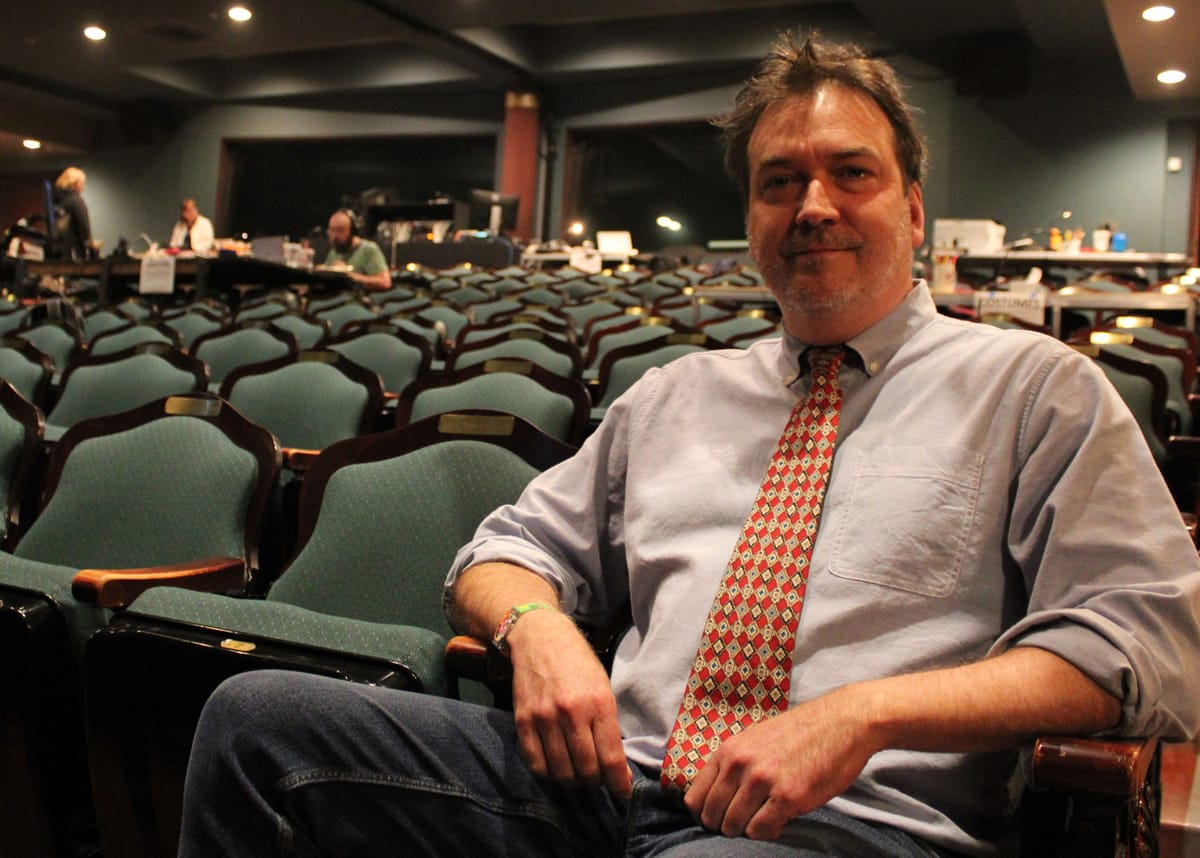
Musician, composer, and sound designer Rob Witmer has been thinking about the interaction between sound and live theatre for 20 years, introducing effects, transitions, and original music that add layers of mood and emotion for productions at venues as large as the 3,000-seat McCaw Hall for Seattle Opera or as cozy as a 40-seat black box space for a fledgling theatre company, and everything in between.
“Sound is so important because of how it interacts and intertwines with the human voice and storytelling,” said Witmer over coffee and pastries at a bakery and café near his home in Seattle’s Madison Valley neighborhood. The occasion was a rare break for Witmer, who typically works on 15 to 20 productions per year and plays the accordion in the performance-art band Awesome, the Weimar Era-inspired band The Love Markets, and the alt-country group Carrie Clark and the Lonesome Lovers. “When sound blends smoothly with a singer, when a piece of underscoring runs beneath someone’s monologue and is in sync, the actor and the sound designer are riding the same wave.”
It's a magical moment that hasn’t gone unnoticed by local theatre critics who describe his work as “eerily percussive,” “deliciously discomfiting,” “unsettling but not overbearing,” and “creating an atmosphere of uncertainty and menace.” This year alone, if you saw The Lehman Brothers at ACT Theatre; Camelot at Village Theatre; Titanish, The Moors, and Once More, Just for You at Seattle Public Theater; Romeo + Juliet at Seattle Shakespeare Company; and X: The Life and Times of Malcolm X at Seattle Opera, you heard Witmer’s unique sound design or original composition.
He’s earned music and sound design honors, including Seattle Theatre Group’s Gregory Award for Richard III in 2019, The Trial in 2013, and Hamlet in 2011; Seattle Theatre Writers’ Gypsy Rose Lee Award for Richard III in 2018, Bring Down the House Parts I and II in 2017, and The Flick in 2015; and BroadwayWorld Seattle’s Critics Choice Award for Richard III in 2018, The Cherry Orchard in 2017, Daisy in 2016, and Evil Dead: The Musical in 2010.
For Seattle Shakespeare Company’s production of Hamlet, he created a hushed, running tone that played as the audience filed into the house. When the curtain speech ended, the tone dropped to absolute silence, and the house went to black for roughly five minutes, with the actors speaking their lines in darkness until the ghost character appeared, ushered in by a loud sound and a blinding flash of light. “Sometimes the sound design is silence,” said Witmer. “The audience felt that. That was a fun play to work on.”
For Seattle Shakespeare Company and upstart crow collective’s co-production of Richard III, staged at Seattle Rep’s Leo K. Theater in 2018, scenic designer Shawn Ketchum Johnson enhanced the play’s fascist and authoritarian mood by creating a dark, bleak, and open stage fitted with giant, triangular boxes anchoring angular steel cables crisscrossing from the stage to the rafters. Witmer and fellow sound designer Meghan Roche turned those cables into percussive string instruments, much like a giant harp’s oversized strings, and amplified them with contact microphones.
“The sound was, quite literally, visible onstage,” recalled Roche, who co-designed the production’s sound with Witmer. “It was basically a big instrument that could be played for dramatic impact throughout the show. The ensemble included a professional percussionist who tapped and beat rhythms on the boxes and strings, which we amplified and ‘sweetened’ with lots of sound effects, soundscapes, and music.”
The result was an indelibly stormy, thunderous, and resonant sound experience for audiences. “That show was unique,” Witmer recalled. “The actors would bang on these cables and create these beautifully lit visual lines.”
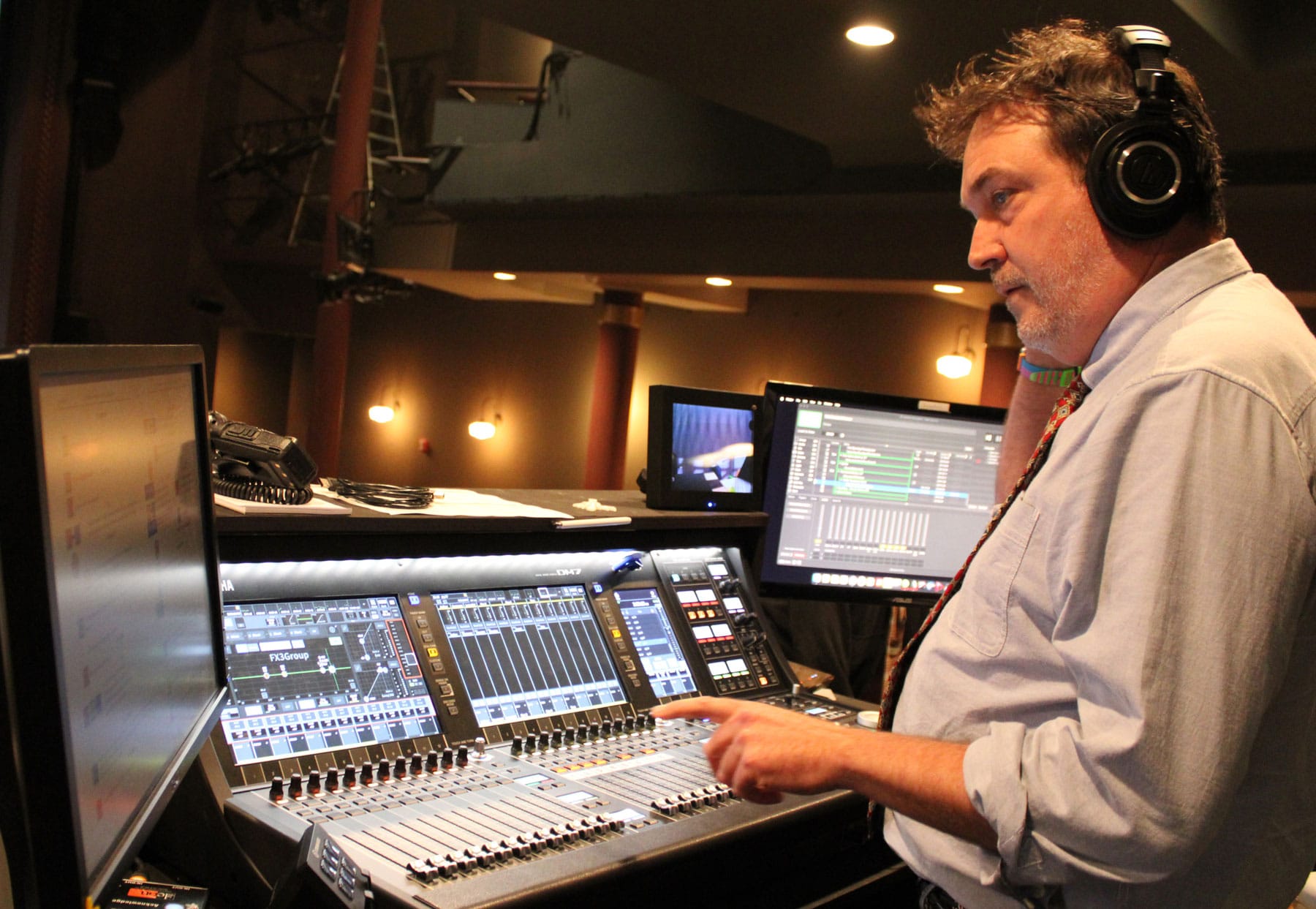
Witmer was a musician long before diving into world-building sound design. He learned to play the clarinet in the fourth grade, an instrument he grew up watching his father play, and the saxophone and steel drums while attending Mercer Island High School, where he performed in the band and orchestra. Perhaps hinting at his future career in the creative arts, he made animated Super 8 movies as a youngster and spent two years in high school co-producing an offbeat science-fiction movie called Star Train, which followed a luxury cruise train soaring through the galaxies en route to one of Jupiter’s moons. Mercer Island High School hosted a film screening, and The Seattle Times interviewed the teenage filmmakers, including 17-year-old Witmer.
He explored reel-to-reel recording equipment, ARP synthesizers, and other electronic music production tools while enrolled at Evergreen State College in Olympia during the late 1980s. He recorded songs with other students and occasionally performed music for live theatre on campus—an experience that “taught me a lot about collaboration and listening to other voices in the room,” he said, “which is basically the most important thing I do now in the theatre.”
Witmer interned at Seattle’s popular Pioneer Square Theater, which ran shows on three stages five nights a week, presented an annual new works festival, and boasted an astonishing six-year run of the musical comedy Angry Housewives. “Eventually, they started to pay me because they realized how important it was to have someone reliable who could run the soundboard,” said Witmer. “That was my first exposure to what sound design could be.” Pioneer Square Theater closed in 1989, and Witmer landed freelance work designing sound for Youth Theatre Northwest.
“A sound should be unique, even if it’s just a door knock. Is the person in a hurry? Are they angry? Are they drunk? It’s always specific.”
He said his first “grown-up sound design work” came in 2006 when Seattle Public Theater hired him to write original music and design sound for The Intelligent Design of Jenny Chow. He took a DIY approach to the production’s varied sound design needs. When the script required the sounds of someone tap dancing in an apartment above, he invited an actor to tap dance in his living room while recording from the basement below. Initially, this approach was born out of necessity—the ability to download sounds from the internet was fairly nascent—but it’s something he prefers today.
“I strongly encourage anyone interested in sound design to record their own sounds,” he explained. Witmer has filled a bathtub to create splashing sounds and banged on metal pipes in his home. He stomped through Magnusson Park before 5 a.m. to record the crisp and crunching sounds of his footsteps on gravel, unadulterated by overhead airplane noise or crowds of people. “A sound should be unique, even if it’s just a door knock. Is the person in a hurry? Are they angry? Are they drunk? It’s always specific. Very rarely does the same stock door-knock work. I think it’s more fun to make a unique sound that helps tell the story.”
Witmer added, “I do hear the same thunderclap cue in theatres all over town. If you pulled your sound effects from Garage Band or iMovie, we would probably recognize them.”
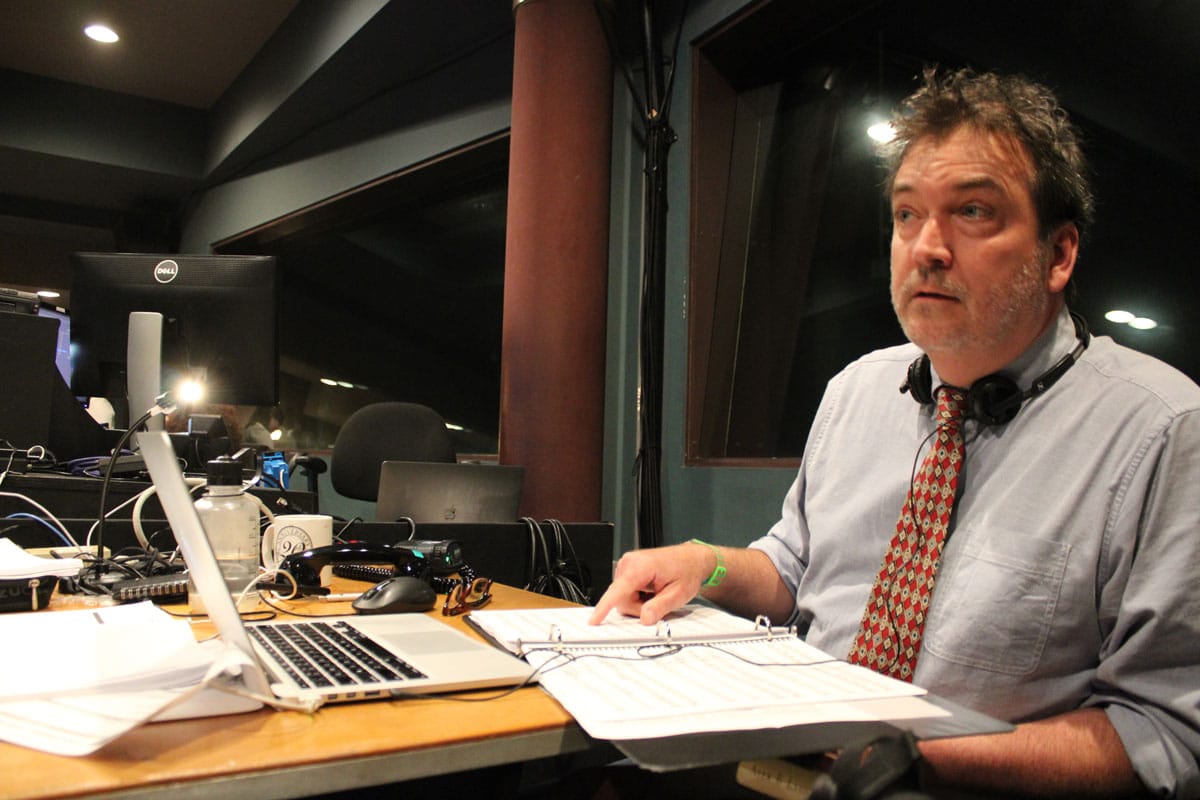
Sound design remains Witmer’s creative playground, an opportunity to have fun, push possibilities, and surprise people. He enjoys the world-building work of collaborating with directors and scenic, lighting, and costume designers to create sounds that help immerse audiences in live theatre. He looks for things that sound right, from the obvious—whistles, bells, and crowds of people at a train station—to the unconventional—a DJ setup with music and sound pouring through a window for the modern, rough-and-tumble Verona envisioned in Seattle Shakespeare Company’s production of Romeo + Juliet.
“Being a designer is so often just about being a good collaborator and good person to have in the room, and Rob is genuinely just one of the best,” said fellow designer Roche. “It’s second nature to him, sussing out what a director may need to enhance a scene sonically and well before they ask him for it.”
And while he might be known for the vanguard sound designs of productions like Richard III or Hamlet, Witmer isn’t offended if audiences leave the theatre talking more about the costume or scenic design than that music or sound design.
“In a weird way, I don’t want someone to notice my work,” he said, preferring for sound design to add subtle, emotional layers. “In the service of a good story or a good play, if no one says anything in the review about the sound design, I feel like I’ve done my job.”

